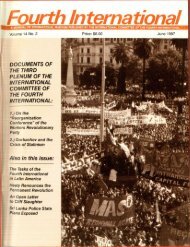Workers League - Behind the US invasion of Somalia - Mehring Books
Workers League - Behind the US invasion of Somalia - Mehring Books
Workers League - Behind the US invasion of Somalia - Mehring Books
Create successful ePaper yourself
Turn your PDF publications into a flip-book with our unique Google optimized e-Paper software.
62<br />
a Third (Communist) International.<br />
<strong>Somalia</strong>: A History <strong>of</strong> Imperialist Brutality<br />
1. King Leopold II (1835-1909) — The ruler <strong>of</strong> Belgium from<br />
1865. He established personal control in 1885 over <strong>the</strong> Congo Free<br />
State (now Zaire). His exploitation <strong>of</strong> <strong>the</strong> colony was notoriously<br />
bloodthirsty, even compared to <strong>the</strong> brutality being carried out by <strong>the</strong><br />
o<strong>the</strong>r imperialist powers. He was obliged to hand over control <strong>of</strong> <strong>the</strong><br />
colony to <strong>the</strong> Belgian government in 1908.<br />
2. Rhodes, Cecil John (1853-1902) — A British imperialist<br />
politician and businessman. He emigrated from Britain to South<br />
Africa in 1870 and made a fortune from <strong>the</strong> Kimberley diamond<br />
mines. He founded <strong>the</strong> De Beers Mining Company in 1880. The<br />
following year he entered <strong>the</strong> Cape Colony parliament and became<br />
premier <strong>of</strong> Cape Colony from 1890 until he was forced to resign in<br />
1896. He strongly advocated British expansion in Africa.<br />
3. Bismarck, Prince Otto Eduard Leopold von (1815-1898)—<br />
A Prussian statesman and diplomat. His main objective was <strong>the</strong><br />
forcible unification <strong>of</strong> <strong>the</strong> small German states and <strong>the</strong> creation <strong>of</strong> a<br />
single German empire under <strong>the</strong> hegemony <strong>of</strong> Junker Prussia.<br />
Bismarck became Chancellor <strong>of</strong> <strong>the</strong> German Empire in 1871 following<br />
<strong>the</strong> defeat <strong>of</strong> Napoleon III in <strong>the</strong> Franco-Prussian war. He was a<br />
vicious enemy <strong>of</strong> <strong>the</strong> working class movement, authoring <strong>the</strong> Anti-<br />
Socialist Law (Exceptional Law Against <strong>the</strong> Socialists) and o<strong>the</strong>r<br />
measures. In 1890, <strong>the</strong> Exceptional Law was canceled. Bismarck<br />
resigned <strong>the</strong> same year.<br />
4. Ethiopia (Abyssinia) — One <strong>of</strong> <strong>the</strong> most ancient kingdoms in<br />
<strong>the</strong> world. Its former kings claimed descent from <strong>the</strong> son <strong>of</strong> King<br />
Solomon and <strong>the</strong> Queen <strong>of</strong> Sheba. As <strong>the</strong> kingdom <strong>of</strong> Axum, it was<br />
prominent from <strong>the</strong> first to <strong>the</strong> eighth century and <strong>the</strong> center <strong>of</strong> a vast<br />
ivory trade. It was converted to Christianity in <strong>the</strong> fourth century.<br />
The area was isolated after <strong>the</strong> Arab conquest <strong>of</strong> Egypt cut its ties to<br />
Byzantium. At <strong>the</strong> end <strong>of</strong> <strong>the</strong> nineteenth century, Ethiopia was a<br />
landlocked kingdom, striving for control <strong>of</strong> neighboring Eritrea as a<br />
gateway to <strong>the</strong> Red Sea.<br />
5. Mussolini, Benito (1883-1945) — The fascist leader who<br />
ruled Italy from 1922-1945. Expelled from <strong>the</strong> Italian Socialist Party<br />
in 1914 for his rabid, social-patriotic support for World War I, he<br />
organized a militantly antisocialist and semimilitary fascist movement<br />
in 1919. He rose to power in October 1922. After 1926,<br />
bourgeois democratic forms were abolished and <strong>the</strong> labor movement





